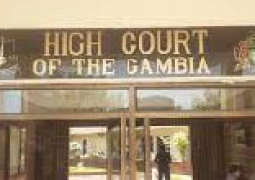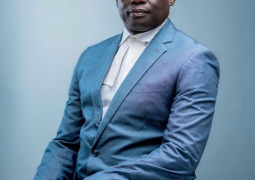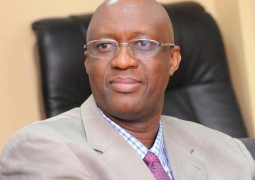Yahya Jammeh, former Gambian dictator was once again accused of “stealing millions of United States Dollars from proceeds of thousands of barrels of crude oil” reportedly supplied to the country by the former Nigerian military ruler, Sani Abacha.
It was known as “The Crude Oil Saga”.
Both the local and international press revealed series of allegations and surreptitious dealings between the two military tyrants. Both Gambians and Nigerians as well as the diplomatic community were stunned and staggered.
During the time, Yahya Jammeh was under intense media and diplomatic pressure. He finally decided to respond to the accusations. As usual, he invited the GRTS to refute the allegations against him. During his interview, he also aggressively threatened anyone involved in the accusations.
But the opposition member in the National Assembly demanded an “official investigation” into the matter and further rubbished Yahya Jammeh's TV denial.
Unfortunately for the opposition, the National Assembly massively dominated by the ruling APRC refused to appoint a Parliamentary Committee as directed to probe Yahya Jammeh's alleged involvement in the crude oil deal.
But due to the huge amount of money involved, Gambians from all walks of life insisted that Yahya Jammeh should be investigated. Even his own party officials quietly demanded a probe.
Nonetheless, thanks to his party National Assembly members whose allegiance was directly to Yahya Jammeh, categorically denied any form of inquiry.
The opposition equally refused to drop the matter and decided to serve all MPs with papers regarding the alleged deal incriminating the Gambian leader.
Soon the allegations were blown-out in Banjul like wildfires.
Hence, a private meeting reportedly took place between Yahya Jammeh and his most influential MPs at his home village of Kanilai. The press was barred from attending - even though he spent most of his time in the village.
During the private meeting with his selected MPs, he asked them to oppose an inquiry.
Nevertheless, outside the National Assembly, the leader of the opposition UDP, Ousainou Darboe, publicly accused Yahya Jammeh of “diverting millions from the proceeds of the crude oil for his personal benefit”.
The opposition leader also said Yahya Jammeh's version with GRTS on the issue was “the most dishonest reaction to any allegation of corruption made against him”.
Darboe maintained that he was in “possession of enough evidence to implicate Yahya Jammeh” and further argued that the Gambia leader had not been “speaking to the nation in a transparent manner - and had not told the nation the truth about the crude oil deal”.
Darboe also told the press that it was necessary to expose Yahya Jammeh because he felt that “the Gambian leader has failed to vindicate himself from such a high-level corruption scandal, known nationally and internationally”. They felt cheated.
During a hastily organised press conference, and attended by this correspondent, the opposition distributed copies of contract documents - some dated August 23rd 1996. It was reportedly between Chantrils Commercial SA and The Gambia government relating to the lifting of crude oil.
“Concession” was granted to the Gambia government by the Federal Republic of Nigeria under its former military ruler, Sani Abacha.
The opposition declared that it had “no doubt that the “concession” was for the benefit of “the people of the Gambia and not for Yahya Jammeh as a person”.
The offer according to the opposition might have been politically motivated after the government took a pro-Nigerian stance at the Commonwealth Heads of Government Meeting which called for Nigeria's suspension following the brutal execution of Nigerian human rights activists Ken Saro Wiwa and other important activists in 1995.
In an affidavit reportedly signed by one D. P. Ford, in the High Court of Justice, Queen's Bench Division, Commercial Court in London, disclosed that “he was a senior crude oil dealer employed by Glencore UK Limited”.
According to the signed documents, Chantrils’ first business with the Republic of the Gambia was concluded with an agreement dated August 23rd 1996. The said affidavit mentioned another Samuel Sarr and Muhammed Jawara, both ‘‘protocol officers’’ to Yahya Jammeh as the negotiators.
The revealing papers also disclosed that a payment of US$900, 000 was required for the first 4, 500, 000 barrels. It also disclosed that “Yahya Jammeh needed the sum to fund his 1996 election campaign”. It was agreed that the first US$500, 000 be paid within three working days of August 23.
The remaining US$400, 000 according to the documents were to be paid in to bank account number J3650-7C at the United Overseas Bank in Geneva on September 13, 1996. It again indicated that after the new terms were signed.
In a “telephone conversation”, Yahya Jammeh thanked them, stating that he expected to receive “another contract from the Nigeria National Petroleum Corporation (NNPC) with more volume of oil which President wanted them to handle for him”.
The documents further revealed several bank transactions to that effect. A bank guarantee in favour of The Gambia and c/o Omni Group in Paris and the Credit Agricole Indosuez London branch were also indicated.
The opposition leader suggested that a total of D38, 426,900.20 was allegedly diverted by Yahya Jammeh for his personal use.
More depressingly, The Gambia also shouldered the burden of settling a legal fee of US$601, 625.32 with interest that was reimbursed to the complainant.
Following the revelations, Yahya Jammeh was visibly upset and publicly issued threats to the private press by “eradicating them and turning them into beggars”. The opposition by “burying them six-feet deep”.
For the business executive members who dared to involve in the inquiry. He scolded: “If you are a businessman and you are anti-government, which is the government of the day, you have nowhere to go. If a businessman wants to fight the government, within one minute, we can make you disappear from the map of the Gambia.''




